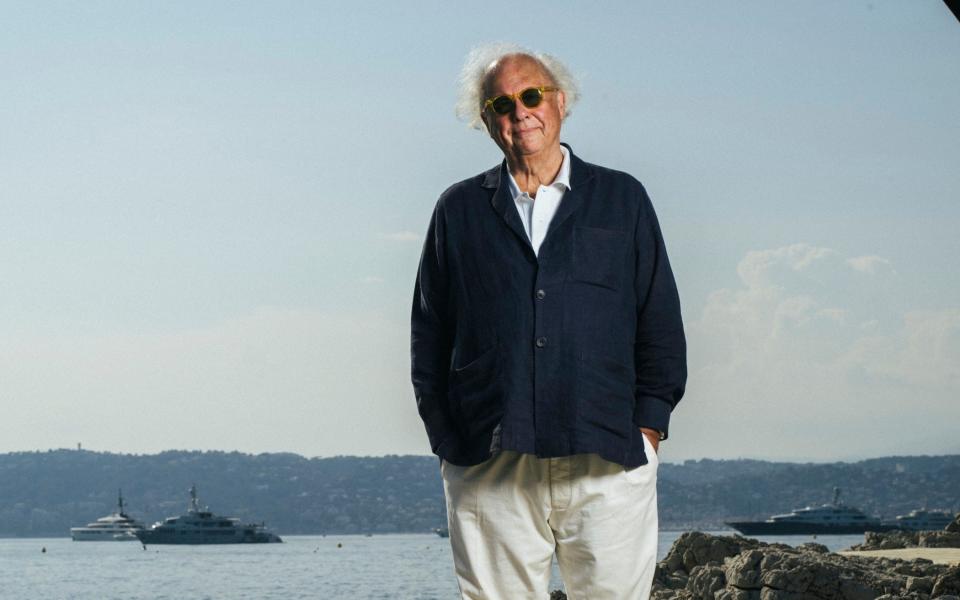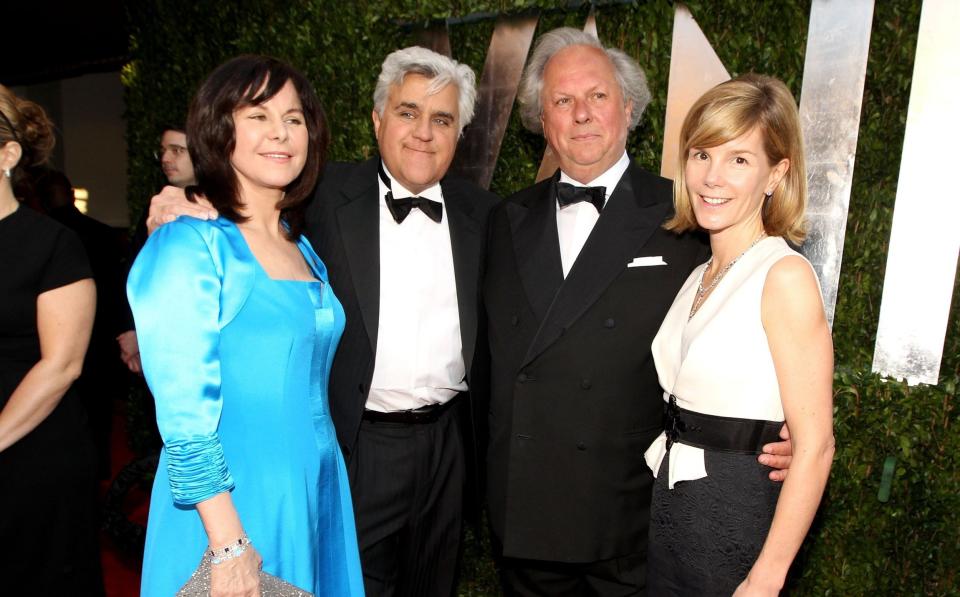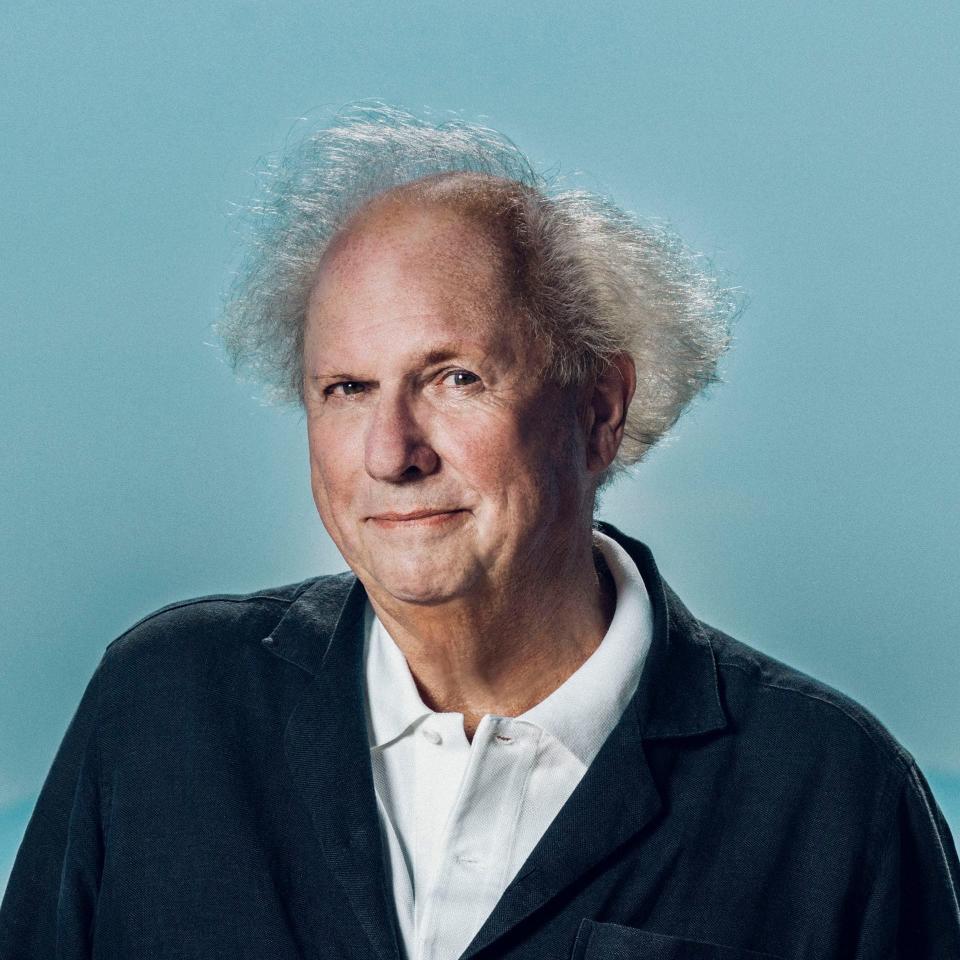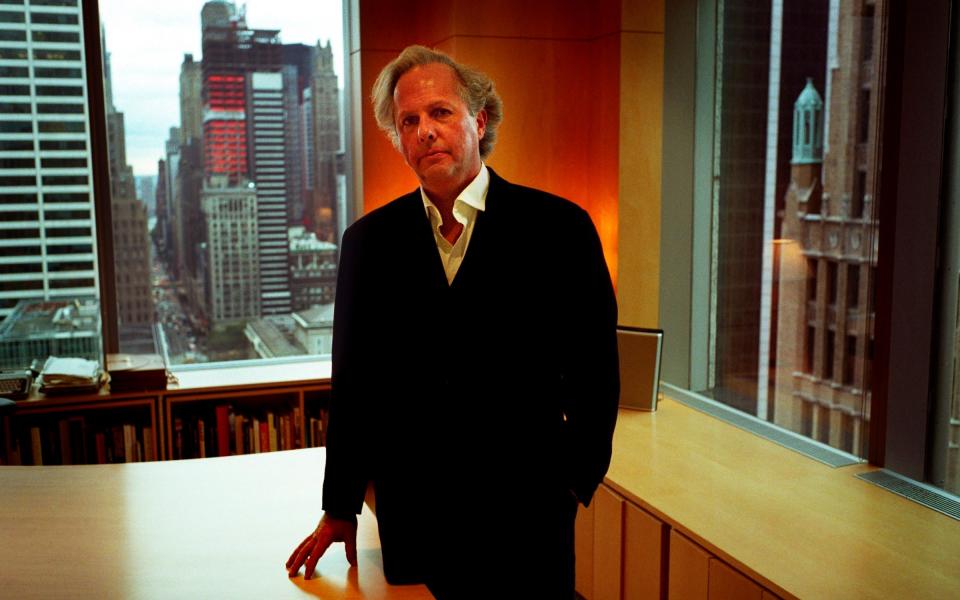‘Harry and Meghan have done something they’ll live to regret’

‘Glamour is a good thing,’ says Graydon Carter, gesturing airily at the scene around him. ‘It’s a significant part of life.’ There is no shortage of the stuff here. We are sitting in the restaurant of the Hôtel du Cap-Eden Roc, in Antibes, where Carter is preparing to host his Cannes party.
Clad in a bespoke blue linen jacket, Gucci slippers and white trousers, with the portliness of a 73-year-old who has drunk deeply of the good life, his grey mane thinned to the verge of extinction, Carter is in his element. Behind him, superyachts rest smugly on the sparkling Mediterranean. Helicopters chugger-chugger overhead. Men and women hasten to and fro with earpieces in. Somewhere in the distance, a guitarist is sound-checking. The following evening, hundreds of glad-ragged attendees will descend.
Carter likes a party. During the 25 years he spent as editor of Vanity Fair, he made the magazine’s annual Oscars party into the most talked-about event of the night, even ritzier than the awards themselves. He also hosted an annual do at Cannes, to which the present event is a kind of successor. It’s under the banner of Carter’s new venture, Air Mail, an online magazine, and co-hosted with David Zaslav, CEO of Warner Bros Discovery, to mark 100 years of Warner Bros.
‘The Oscar party got too big, it was too much of an event,’ Carter says. ‘The Cannes one was always much more fun and relaxed.’ There is an unspoken rivalry here. A few days earlier Vanity Fair has hosted its own event at the same hotel, and the consensus is it was a bit of a let-down. Carter is back, party daddy, to show them how it’s done.
‘I’m pretty good at it,’ he concedes. ‘You do your homework. Who you don’t invite is as important as who you invite. You could have 100 great people and one mass-murderer, that sort of overshadows the whole thing. You do your best to avoid having couples at a table where there might have been a sexual episode with someone else at the table. When you’re here in Europe you try to get everyone’s titles right. I’m a big fan of having the hosts near the front door to welcome people. Everyone’s anxious about coming to a party, so when the host welcomes you it reduces their anxiety a bit. Alcohol helps, too.’

There has been the odd mishap over the years. ‘People starve themselves to get into a tuxedo or a dress,’ he says. ‘One year someone came down to tell me that Isabelle Huppert had fainted and might be dead. I went up to see her and she was the colour of asphalt, so I thought she was dead, but then she suddenly came back to life. She hadn’t balanced the food and liquor intakes. Another year a friend of mine got stuck in the bathroom, when he heard a man outside say ‘stay back from the door, stand on the toilet’, before he kicked the door in. It was Jean-Claude van Damme. Then about 20 years ago my wife and I were swimming in the pool and a bunch of Americans were making a lot of noise on the terrace above. Then one jumps off and does a huge cannonball, soaking everyone around the pool – it was Philip Seymour Hoffman.’
Does he still get the pre-party jitters? ‘Are you kidding?’ he laughs. ‘I took a beta blocker before I came down. I get nervous because I want everybody to have a nice time.’
If parties are one of Carter’s great loves, the other is magazines. Born in 1949, Carter grew up in a small town in Ontario, Canada, dropping out of university to focus on magazines. His first, The Canadian Review, was initially successful but eventually went bankrupt. He moved to New York to join Time, where he was part of a golden generation of young journalists, including Maureen Dowd and Michiko Kakutani.
‘I always thought there was a glamour to journalism,’ he says. ‘It’s a wonderful profession, and you can do great things, but you should also have a good time if you can, otherwise why do it? You’re never going to make a fortune, so if you’re not enjoying it, don’t do it.’
At Time he met Kurt Andersen, with whom he founded the satirical magazine Spy, which skewered the newly minted New York society of the 1980s. In one memorable feature, they sent cheques for 64 cents to dozens of millionaires to see which of them were tight enough to cash them. To those who did, they sent follow-up cheques for 32 and then 16 cents. One of the only two who cashed the final cheque was Donald Trump. Carter was an early adversary of Trump: their feud goes back to 1983, when Carter spent three weeks with him for a magazine profile.

‘He wasn’t without his charm, but a real hustler,’ Carter remembers. ‘And his hands were much too small for his body. If you want your hands to look bigger, have small cufflinks, but he had enormous cufflinks that made his hands look even smaller. Then his cuffs were so big that it looked like his hands were swimming in the rest of the shirt.’ Spy described him as a ‘short-fingered vulgarian’, which Trump apparently hated, and since then they have been engaged in a tango of critical pieces and threats of legal action.
‘I never thought Trump would be this bad,’ he adds, turning more serious. ‘I knew he’d be venal, corrupt, vulgar, but I didn’t think he’d be this.’ He thinks the American voters will stop him getting back in, but then he didn’t think they’d go for it the first time.
In 1991, Spy was bought by investors including Charles Saatchi. After a brief stint at the New York Observer, Carter was headhunted by Si Newhouse, the billionaire owner of Condé Nast, to take over Vanity Fair, which had recently been revived by Tina Brown. Along with Brown and Vogue’s Anna Wintour, Carter was one of the big beasts of American magazine journalism of the 1990s, an era of Concorde, limousines, supermodels and seemingly unlimited cash.
‘When I joined Vanity Fair we didn’t have budgets,’ he says. ‘You spent what you needed, but you made a lot of money for the company. You try to spend it responsibly, but journalism is expensive. Those were the good days.’ The catering budget alone for one of Annie Leibovitz’s photo shoots was more than an entire issue of Spy cost to make. ‘I did say I didn’t think we needed to spend that kind of money. It struck me as a huge waste… Nobody is going to eat much when they’re having their picture taken.
‘You don’t know you’re in a golden age when you’re in a golden age,’ he says. ‘But to be in the magazine business in New York from 1978 to 2008 was a 30-year period we will never see again.’

The money meant he could afford to hire the best talent around, including British writers like AA Gill and Christopher Hitchens. ‘Americans are better at investigations, but Brits are better at the art of writing,’ he says. ‘Christopher was the first person I hired.’ They became friends, their only notable disagreement coming over the Iraq war, which Hitchens supported. ‘I was the only major editor in America who wrote against the Iraq war from the moment it was planned. Everybody else was pro-war. I was shocked. Especially men. It was an awkward period with Christopher. He had his rationale, but I couldn’t bear to listen to it.’ It has not always been easy with his fellow editors, either.
‘Anna Wintour and I were very close at one time,’ he says. ‘She was much more easy-going and cosier in the 1990s, but she became very competitive. You were never sure which Anna you’d meet. She’d either treat you like her best friend or the car valet, and a lot of times she treated me like the car valet.’ Perhaps not coincidentally, Carter’s standing down coincided with Wintour’s elevation to chief content officer for the whole of Condé Nast, making her, in theory, Carter’s boss.
Under Carter’s tenure, Vanity Fair was a seductively glossy mix of reportage, Hollywood and humour, which consistently broke scoops, as when it revealed the identity of Deep Throat, who had been Woodward and Bernstein’s source for the Watergate scandal. It wasn’t without controversy. Recently Vicky Ward, the author of a story about Jeffrey Epstein, has said that she was stopped from writing more about him, but Carter has said they didn’t have the evidence to stand it up. Is anything about Carter’s time more obvious in hindsight?
‘It was probably whiter than it should have been, but it largely reflected the culture of the time,’ Carter says. ‘If it hadn’t, it wouldn’t have done well.’ When I put it to him that in the wake of the Black Lives Matter protests, Wintour wrote an apology for not having greater diversity within Vogue’s pages, Carter shrugs. It is the only time in the conversation he is not forthcoming.
His new venture, Air Mail, is online-only, is staffed by mostly millennials – including his eldest son – and has some of Vanity Fair’s mix of intrigue, scandal and glamour. It is not yet profitable, but he has a plan. ‘We have a three-year path to profitability,’ he says. ‘It took Vanity Fair nine years.’ Air Mail gives him an excuse to keep in touch with the news, both in America and over here.
‘I love British politics because the stakes are so low, but the bitterness and infighting are so high,’ he says. ‘Britain doesn’t have the economy of California, but it still thinks like it’s after World War Two when there was Russian and British conflict. But I don’t think Putin could find Britain on a map.’ He says he listens to The Rest Is Politics and The Rest Is History.

‘Journalists must have loved Boris Johnson, he was just spectacular copy,’ he says. ‘Trump is much more evil. Boris lied, but with better diction. What kind of a journalist writes two columns, one pro-Brexit and one anti-Brexit?’
Given his disdain for these elected politicians, I wonder what he makes of their unelected cousins. Carter threw parties at the Serpentine Gallery in London, including the one to which Princess Diana wore her famous ‘revenge dress’.
‘I have no interest in the royals whatsoever, but I think for the British they’re like the way Disneyland needs Mickey and Goofy and Pluto, because they’re part of the narrative and that’s what people come to see. In Britain, if you take away the Royal family it becomes like a small Middle Eastern country. It’s like the Magic United Kingdom. I love it when things go wrong for them. When things go right it’s boring.’
We speak soon after reports of Harry and Meghan’s ‘car chase’ through Manhattan have come under scrutiny.
‘Harry and Meghan are just fascinating concepts,’ he says. ‘They’ve done something they’ll live to regret, which is their children have no relatives. They have no cousins that they see, or uncles or aunts, and they don’t see grandparents, except for one. That will come back to haunt them at a certain point. Montecito is gorgeous but it’s God’s waiting room: there is nothing, nothing, nothing to do. It’s a 40-minute drive from LA. There can’t be many kids there because young families can’t afford it. It’s a lonely, beautiful place.
‘I’ve lived in New York for 50 years and you can’t go faster than three miles an hour,’ he adds. ‘When I first read about it I thought, “That doesn’t look right.” They have too much attention. For people like that, unavailability is your greatest asset. If you’re out there too much, the public has a chance to get sick of you. I think they’ve made every wrong move you can make.’
He has other interests. He has produced documentaries, including The Kid Stays in the Picture, about the producer of the Godfather films. He’s trying to make a film about Hitchens. He likes canoeing. He owns a restaurant in New York, the Waverly Inn. He has five children: four from his marriage to Cynthia Williamson – the couple divorced in 2000 after 18 years – and a 14-year-old daughter with Anna Scott, whom he married in 2005.

Over lockdown he started writing a memoir. He has written it with the help of James Fox, the British journalist perhaps best known for writing Keith Richards’ memoir, Life. ‘Keith has a much more exciting life than mine,’ Carter allows. ‘I did think that nobody would give a s--t about an upper-middle-aged white male, but James is very good at getting things organised. There won’t be any score-settling, only stories that I think will be embarrassing to me, funny, universal or illuminating. Life is about a succession of minor failures; the key is to keep them minor.’
Will he not even settle scores with Toby Young? The British journalist went to work as a contributing editor for Vanity Fair in the 1990s and turned the experience into a book, How To Lose Friends and Alienate People, which became a film starring Simon Pegg as Young and Jeff Bridges as Carter. It was not a flattering portrait.
‘No good deed goes unpublished,’ he says, another flash of steel breaking through the bonhomie. Carter is good company, but I wouldn’t want him as an enemy. ‘I gave him a job and he betrayed me. I have no idea what he does now.’
He says his book is 85 per cent complete. But first, there is a party to throw. As he stands up to say goodbye he notices two blonde women who have sat down at a corner table. ‘That’s my next wife,’ he exclaims, not far from his actual wife, Anna. ‘Which one?’ asks his assistant. ‘Both of them!’
At 10pm the following evening, I present myself back at the hotel. Security guards line the path down to the restaurant. Clips from classic Warner Bros films are being projected on to the swimming pool, so Ben Hur’s chariots gallop over the glassy water. Dom Pérignon is poured into plastic glasses. (Even here, there is no glass by the pool.) A DJ plays but the guests are too busy looking to dance. Leonardo DiCaprio walks past with a man so small he can only be Martin Scorsese. Robert De Niro arrives soon after, followed by Jason Statham and Rosie Huntington-Whiteley. They are escorted to a raised sofa: you never escape hierarchy.
Boy George and Sting are not on the raised area – in this company, Boy George is barely famous – and nor are Scarlett Johansson or Rebel Wilson. Lily-Rose Depp, daughter of Johnny and Vanessa Paradis, sits quietly on a bench on the side. David Zaslav, Carter’s co-host, who a few days ago was booed at an event for not supporting screenwriters, nearly comes a cropper on a step, after which staff materialise with little lanterns to warn others.
Carter, with a white jacket fastened around him, presides over things with patrician élan. He greets and welcomes. Later, I see him standing apart from the party, looking from one group to another with approving eyes. I go over to say hello. ‘Finally, I can relax,’ he says, with an exhausted smile. It’s hard work, all this fun.

 Yahoo Sports
Yahoo Sports 